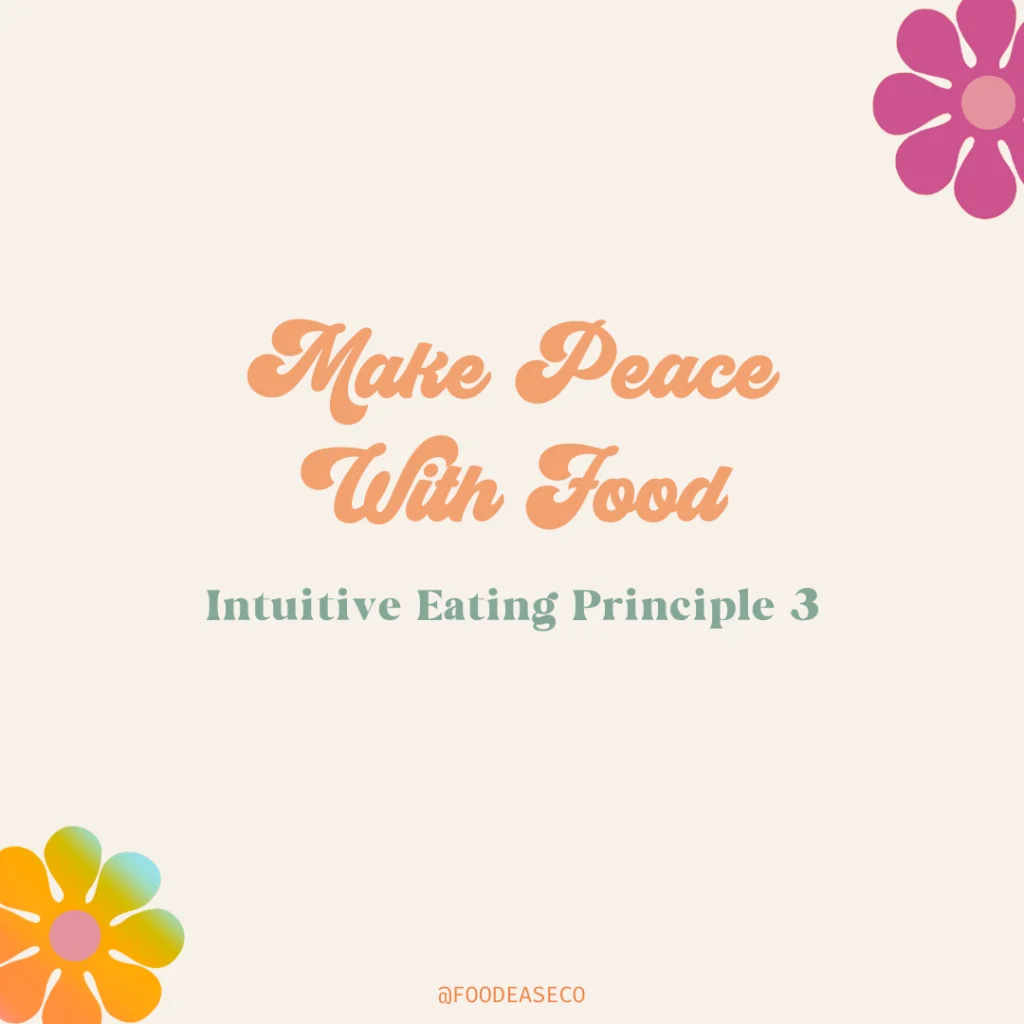Intuitive Eating Principle 3: Making Peace with Food

Introduction
Think about the last time you went on a diet and restricted an entire food group. In grad school (during the height of my nutrition education) I thought I’d try going keto.
The very thought of cutting all carbohydrates terrified me, but I believed it was what I had to do to find a more optimal way of living. I was desperate and like usual, attributed my exhaustion and “heaviness” to “poor” diet, which sent me into the arms of yet another diet.

When you restrict something or have limited access, isn’t it all you can think about? I know when I’m on a hike and my partner has drunken all the water, all I want is one sip of water.
It’s the same when it comes to food. The very thought of restricting an entire food group for the foreseeable future sends us into binge-territory. Sound familiar?
Deprivation often leads to obsessive thoughts and craving larger quantities of that food. Maybe, we finally “allow” ourselves to have that food and we binge because this is “the last time” so we have to get it (all of it) while we can. This is otherwise known as “The Last Supper Eating.”

Consider this study from Northwestern University. The purpose of the study was to determine how diet thinking might affect eating after drinking a milkshakes. The participants were led to believe the goal was to evaluate the taste of ice cream samples.
There were three groups based on the number of milkshakes given. After drinking the shakes, the subjects were asked to rate three flavors of ice cream and were allowed to “taste-test” as much as they wanted.
The non-dieters of the group ate less ice cream in proportion of the amount of milkshakes consumed.
And the dieters you wonder? Those in the two milkshake group ate the most amount of ice cream.
This kind of restrained mindset around food is what leads to over consumption.
Letting go of our food rules and giving ourselves unconditional permission to eat can be scary and even hold us back when trying to tackle Intuitive Eating
Some Common Fears Around Unconditional Permission To Eat
I wont stop eating. When you realize previously forbidden foods are now (literally) always on the table, we tend to crave them less and the urge to have large quantities of that food lessens as well. It’s called habituation.
Habituation is when you your hear someone tell you that they love you for the first time. The first time is ~magical~ but once you hear it often, it becomes expected and routine.
Same goes for food. If you want the cake, eat the cake. Tomorrow, chances are, leftover cake won’t be as enticing and you won’t want as much.
I’ve tried it before. Maybe you’ve tried this principle before, but still had that little voice saying “you really shouldn’t be eating this.” Maybe we justify it by vowing to “eat right” tomorrow.
That is not unconditional permission.
Let’s try it again without the “I shouldn’t” or any other morality tied to the process.
Lack of self-trust. Trusting your body for the first time to tell you when you’re full can feel like a big jump. Especially when we’ve been fighting our hunger cues with chronic dieting.
This could stem from when we were children and our parents made us eat beyond fullness to be in the “clean plate club.” Or maybe a casual comment of “you can’t be hungry” as you’re reaching for a snack feeling famished.
We grow up with a lot of mixed messaging from our parents, friends, and, especially, diet culture.
Self-trust takes time, but be firm in the knowing that you know your body best.
And the most common push back to Intuitive Eating:
I won’t eat healthfully. Right now you may be craving previously forbidden foods, and that is perfectly OK and normal. Later in your intuitive journey, you’ll start building balanced meals. It all comes with the process and re-building trust with our body.
This step of Intuitive Eating can be particularly scary. A lot of fears come up around forbidden foods depending on how long we’ve been restricting them. Working with an anti-diet dietitian may be helpful.
Check out the new resource “Giving Yourself Unconditional Permission To Eat” to work through some of the nuances to this principle. It guides you through incorporating previously “forbidden” foods and some journal prompts to work through some lingering fears.
Cheers to unconditional permission to eat,
Emily
Have a Question?


Do you have any questions or suggestions? Feel free to contact us! Just leave your email here, and we will get back to you shortly.